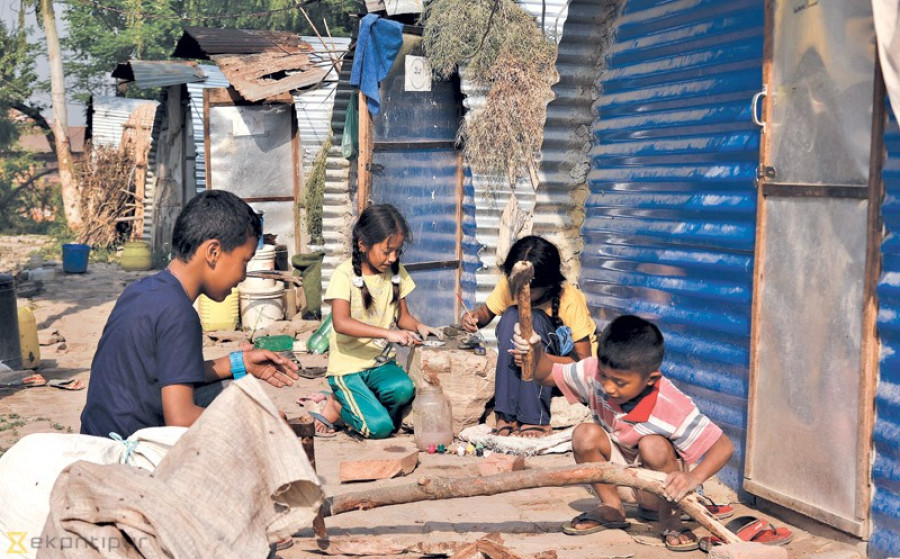National
Right to housing law must extend protection to tenants, squatters: Amnesty report
Director of Amnesty International Nepal Nirajan Thapaliya says the government has been increasingly enacting laws related to fundamental rights without any consultation with stakeholders.
Tsering D Gurung
Amnesty International Nepal has called on the government to strengthen the new legislation on the right to housing needs for it to be fully realised by all individuals—irrespective of their status.
While Amnesty International’s report “welcomes” the inclusion of right to housing as a fundamental right guaranteed under the Constitution, it notes the Right to Housing Act which came into effect last September, “has failed to fully meet Nepal’s international human rights obligations concerning the right to adequate housing.”
“The government has been increasingly enacting laws related to fundamental rights without any consultation with stakeholders,” said Nirajan Thapaliya, director of Amnesty International Nepal. “Through this report we want to inform and advise the government about the shortcomings in the law and call for amendments.”
One of the main problems with the current law is the lack of protection guaranteed to tenants against forced eviction, the report “Nepal: Adequate Housing for all: Analysis of the Right to Housing Act 2018” has pointed out.
Article 37 (2) of the constitution states: “No citizen shall be evicted from the residence owned by him or her nor shall his or her residence be infringed except in accordance with law.”
The report describes the provision as being “completely owner-driven.”
“Only those who own the house or land they occupy are protected from forced evictions, and the same is not available to those who rent or lease the house or those who do not have security of tenure,” the report says.
As per the provision, to claim protection against forced eviction, an individual must provide proof of land ownership. This is problematic, said Thapaliya, since a large number of the population, particularly those living in the urban areas, are tenants.
“In the absence of guaranteed protection, tenants are vulnerable to exploitation and harassment by landlords,” said Thapaliya. “The authorities can also use this provision to forcibly evict squatters with impunity as they have done in the past.”
Former chief justice Kalyan Shrestha, who was one of the speakers at an interaction programme organised to discuss the report, said no individual should be subject to illegal eviction.
“Protection against forceful eviction should be offered to every individual,” said Shrestha. “No person should be made homeless in the name of development.”
Another former chief justice, Susila Karki, echoed similar sentiments, and called for amendments to the Act.
“The current act is incomplete and needs to be strengthened in order to ensure that the law protects the marginalised,” said Karki.
Adequate housing for all remains a major challenge in Nepal. Nearly half of Nepal’s population lives in substandard housing, and over 70 percent of people’s houses are structurally unsafe, according to the 2011 National Population and Housing Census.
“Occurrence of natural disasters and impacts of climate change frequently exacerbate the housing problem in Nepal,” the report says. Those worst affected by the disaster, according to Amnesty, are those already marginalised, including landless people, women, Dalits and other caste-based and ethnic minorities.
The report highlights how landless people have been denied access to reconstruction grants provided by the government because they did not possess a land certificate—the main document required to apply for the grant.
“Exclusion from government grants to re-build houses left those already marginalised in an even more disadvantaged position,” it says.
“With less than a third of all homes structurally unsafe, nearly half the population living in substandard homes and one in ten people homeless, legal protections are urgently needed to ensure that people can live in safe, humane and durable conditions,” said Raju Chapagai, South Asia Researcher at Amnesty International.
The reports also calls for the extension of the scope of constitutional protection under Article 37 to include non-citizens and notes the law’s failure in including a provision of accountability against acts that render someone homeless including through forced eviction and harassment of the tenant or occupant by landlord.
“In view of the prevailing discriminatory practice against Dalits, people living with HIV, and sexual minorities in relation to rental housing, the Act should also have incorporated measures to tackle discrimination,” reads one of the recommendations.




 9.83°C Kathmandu
9.83°C Kathmandu














